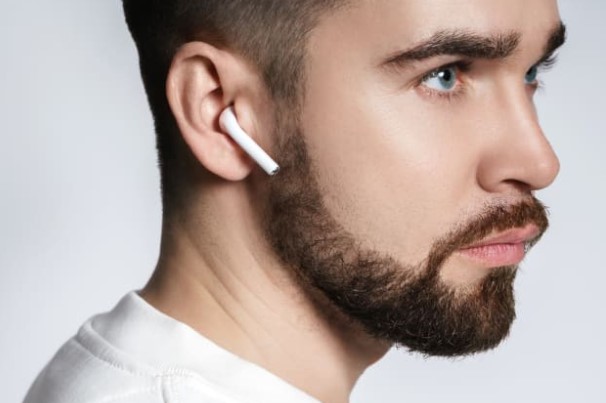In many different types of workplaces, employees wear earbuds or headphones throughout the day. Should employers allow them to? The answer depends on the employer’s industry, as there may be safety concerns and worries about diminished collaboration; but also the possibility that earbuds help workers focus and boost retention.
“As younger generations enter the workforce, it is important for employers to recognize that personal technology device use in the workplace is only going to grow more common. As such, it is important that employers get ahead of the curve when developing policies on the use of technology like earbuds and headphones in their workplace,” said Hogan Crosby, an attorney with Adams and Reese in New Orleans.
Safety Concerns
In mechanical, construction and industrial settings, the use of earbuds may limit the employee’s ability to hear emergency alerts and be aware of their surroundings, said Dennis Duffy, an attorney with Kane Russell Coleman Logan in Houston. For example, an employee walking in an active construction area may be less able to hear ongoing mechanical equipment or warnings from other employees.
“Distracted working—like distracted driving—increases if the employee is actively using earbuds to hear music or engage in phone calls,” Duffy said. “In environments where hearing protection is mandated, earbuds can interfere with the effectiveness of personal protective equipment.”
If workers are wearing earbuds and can’t hear what is going around them, they may not know they are in harm’s way—such as where there is moving equipment or forklift traffic and warning signals, said Heather MacDougall, an attorney with Morgan Lewis in Miami.
Even if a forklift driver isn’t wearing earbuds because that worker is in a safety-sensitive position, a fellow employee wearing earbuds in the vicinity may not hear the piece of equipment or may lack a heightened awareness when walking near a powered industrial truck’s path, she noted.
In certain industries, “the legal concerns here are more clear-cut, as the use of headphones in certain situations can be an outright of violation an employer’s duty to provide a safe workplace,” Crosby said.
There may be safety concerns in retail jobs, he noted. If an employee is stocking shelves in a grocery store and has headphones in, they may not hear an employee or customer coming behind them or around a corner and could potentially cause injury by failing to notice that person.
Even in an office setting, a worker distracted by earbuds might walk around a corner with hot coffee and bump into a co-worker, spilling on them, Crosby said. However, he added that employees who work in office jobs pose little safety risk to themselves or others by using headphones.
Diminished Collaboration?
Safety isn’t the only concern. Some employers worry that earbuds diminish employees’ interactions.
“In workplaces where collaboration is important, constant use of earbuds can impede that collaboration since active use of earbuds—playing music, phone calls—has an isolating effect,” Duffy said.
If employees are using headphones at even reasonable volumes, their ability to hear and interact with employees around them will be impacted, Crosby noted.
“There is a give and take, though,” he said. While the use of music might boost creativity for one employee or help them focus, it might distract a co-worker unless headphones are used. “In this sense, headphones can actually provide a solution to both problems,” he said.
However, in customer-facing roles, the ability for an employee to be fully aware of their surroundings and respond quickly to customer questions is a priority, Crosby said. “There often are perceptions from store customers, or even co-employees, that a person with headphones in seems more unapproachable than someone who does not,” he noted.
An employer can survey employees about how they think earbuds would impact productivity and safety in the workplace, Crosby added. “By getting employee input, this can help an employer ensure that their policy is crafted to the practical realities of the employees and also help employees feel as though they are a part of the decision-making process,” he said.
Improving Focus
For office jobs, focus-improving music in earbuds can improve an employee’s productivity by minimizing outside distractions, Crosby said.
Moreover, courts have found noise-canceling headphones to be a sufficient reasonable accommodation under the Americans with Disabilities Act for employees with sensory overload or attention deficit issues, who might otherwise be unable to focus due to workplace noise, he noted. In these cases, courts have ruled favorably for employers that have offered employees the option to wear headphones that minimize background noise and allow the employees to focus, he said.
Headphones are seen as an option that is cost-efficient for both the employee and employer, and as not being overly disruptive of the work environment or posing an undue hardship on the employer, Crosby said.
These cases have largely dealt with employees who work in desk-based jobs in an office setting, where their use of headphones poses very little safety risk to themselves or other employees, he noted.
Retention
“To be competitive in the labor market, employers have to be realistic about employee use of such devices,” Duffy said. Instead of banning use outright, he recommended placing commonsense limits, particularly in settings that are safety-sensitive or during time periods when paying attention and employee-to-employee interactions and collaboration are important.
“No doubt, earbuds are popular, particularly for those performing repetitive job tasks, and it may be attractive to consider offering this privilege as a benefit to your workforce,” MacDougall said. “Earbuds can help with concentration, stress and productivity and even keep workers happy, leading to better retention.”
However, she added, an employer considering whether to allow employees to use earbuds must exercise caution. “It may be that, as popular as they are, they are not safe for your work environment,” MacDougall said.
